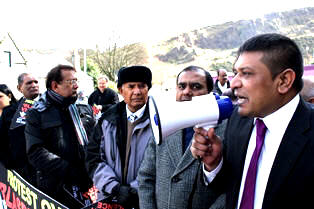Do away with Pakistan's minority legislators

My pessimism with Pakistan minority legislators of all political persuasions has intensified over the years. In my opinion they couldn't care less about the people they purport to represent.
Sheraz Khan is seen here recently addressing demonstrators outside the Scottish Parliament as they protested against the widespread misuse of Pakistan's blasphemy laws
Far from leading their people from the front, the list of their betrayals -- from signing a Sharia bill in the late 1990s, to their approval of the government's decision to include religion column in Pakistan passports in 2005 - are just a few of them.
They have also played an almost non-existent role in facilitating the claim of minority people for government jobs to the absence of initiatives aimed at stemming the increasing social exclusion of minority people in the country.
Their apparent indifference at times when man-made tragedies in the case of blasphemy-related incidents or natural disasters such as floods which have affected many in the minority population, is agonizingly long.
I understand that representing minorities in Pakistan - a country whose politics are divisive, whose institutions are shambolic, whose people are polarized along religious, ethnic, linguistic, cultural and linguistic lines, a land where terrorist attacks and target killings, have become the norm rather than an aberration.
The nation of my birth is sadly a place where some people would not have any compunction in falsely accusing a person of having committed blasphemy. It is not an easy role to take on when one's life and the life of one's family could be put at risk by advocating the cause of the disadvantaged minority communities.
That said, the complacency and the chronic underperformance of the minority representatives, as is evident from their previous performances in the law-making institutions, cannot be pardoned simply because the job is inherently dangerous. One would assume that before entering politics they would have considered other career choices.
The impact of exogenous threats such as Talibanization, Islamization, growing fundamentalism and fanaticism aimed at the already vulnerable minorities communities, has been widely reported, and rightly so, but the endogenous threats: minority people's growing mistrust of each other and their increasing disaffection of their representatives in parliament and their low self-esteem are also substantial barriers in the way of minority people achieving their full potential.
As well as dealing with the deleterious fallout from external threats on minorities these minority MPs must take remedial measures to help treat the internal malaise before it is too late.
And my view is that if minority representatives in the Pakistani parliament do not have any answers to the ever increasing problems faced by their electorate, they must accept their incompetence and go home.











